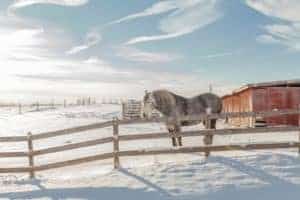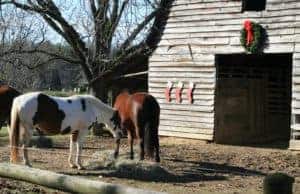
Making Winter Manageable on Horse Farms
Don’t wait for the first snowflakes to prepare your horse property for the cold, dark, and wet months ahead.

Don’t wait for the first snowflakes to prepare your horse property for the cold, dark, and wet months ahead.

Horses are very adaptable and typically can handle significant temperature changes; however, when we alter their natural condition, they might struggle.

One expert explains why closing your barn doors and windows during the winter might not be ideal for your horse’s health.

Learn how air quality issues such as wildfire smoke and pollution can affect your horse’s respiratory health.

Improving the air quality in your barn can protect horses and humans against respiratory dysfunction.

These practices will help minimize odors on your farm to keep you, your horses, and your neighbors healthy and happy.

You might need to make adjustments to keep your horse healthy and happy through the winter.

Learn how to keep your barn and other buildings safe during winter cold and snow.

Find out what might happen if your horse eats that wreath hanging on his stall door.

If you house your horses in a barn, keeping it well-ventilated is an essential part of their care.

Keep dust to a minimum in arenas, barns, and paddocks for both aesthetic and health reasons.

A veterinarian gives tips for creating your own equine facility with horse health in mind.

Consider these horse health- and safety-oriented design aspects when building or renovating your barn.

Find resources on using management strategies to keep your horses healthy during the week of Aug. 1 on TheHorse.com.

As tough as steamy summers can be on humans, they can be even harder on horses. Two veterinarians share tips on how to help your horse beat the heat this summer.

Find out why wasps might be more aggressive in late summer and how to deter them from moving in to your horse barn.
Stay on top of the most recent Horse Health news with
© 2022 Copyright Statement dolor sit amet, consetetur sadipscing User Terms, sed diam nonumy eirmod tempor invidunt ut labore et dolore magna aliquyam erat, sed diam voluptua. At vero eos et accusam et justo duo dolores et ea rebum. Stet clita kasd gubergren, no sea takimata sanctus est Lorem ipsum dolor sit amet.
"*" indicates required fields